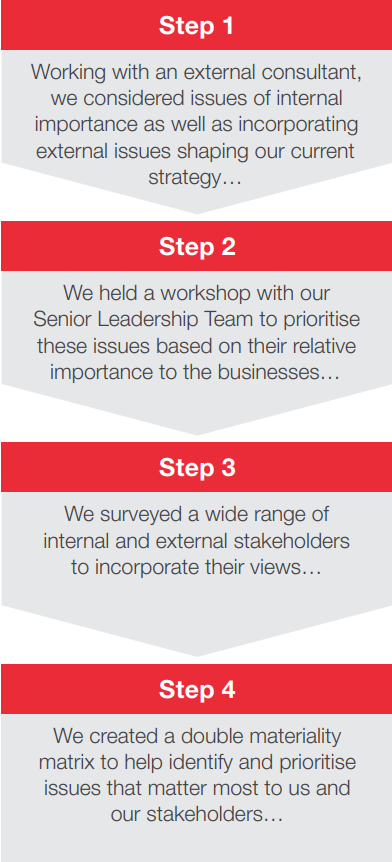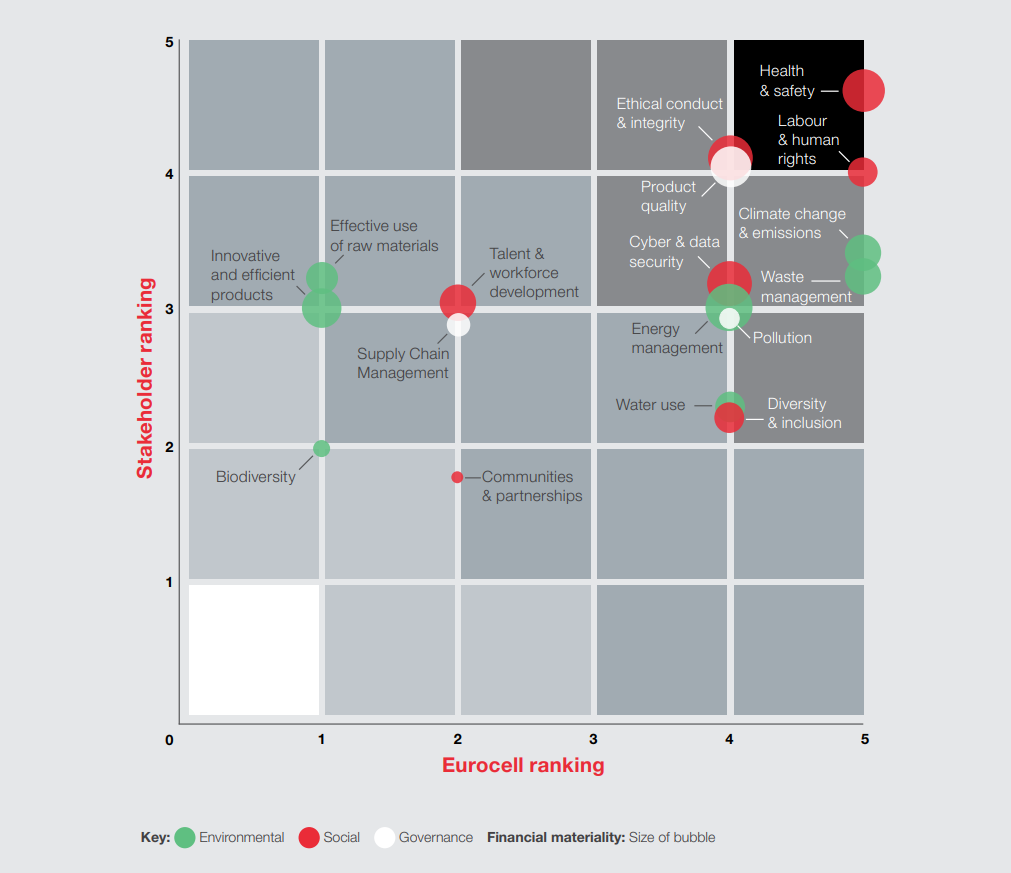Why sustainability matters
Eurocell is committed to operating a sustainable business and earning a reputation for being a truly responsible company. We also aim to lead the fenestration sector in sustainability. We are focused on reducing our carbon footprint, valuing and supporting the wellbeing of our people, and improving the environment in which we operate.
Our Group’s purpose is to create sustainable building solutions for the trade of today, the homes of tomorrow and the environment of the future. Circular economy principles lie at the heart of our strategy, as we recycle old PVC window profiles into new products. In addition, we aim to reduce our environmental impact via energy saving initiatives and waste management schemes. We also generate savings for our customers through products that limit heat loss and lower energy bills. We endeavour to provide an excellent, safe workplace for our colleagues and ensure they feel supported and valued. We are also committed to playing an active role in our communities and being a good neighbour.
In developing our sustainability strategy, we have recognised that our customers, staff, other stakeholders and the communities in which we work, are placing increasing importance on environmental, social and governance (ESG) issues.
In 2024, we will improve our data collection to help us set challenging targets for the business as we develop a pathway to Net Zero. We will focus specifically on developing our climate transition plan and on carbon emission reduction targets. We will also aim to make a positive impact and difference to our customers, employees and communities.
The leader in sustainability in the fenestration sectorplus
- Maximise recycled content in manufactured products
- Ethically source raw materials and products
- Progressively reduce carbon footprint on a path to Net Zero by 2045
- Be a responsible neighbour, wherever we operate
- Minimise waste and usage of plastic packaging.
A great place to workplus
- Driven by our purpose, we will live and breathe our values without compromise
- Employee safety and welfare is always front of mind
- A diverse business, where people can be their true authentic selves
- Excel at developing people, by nurturing talent and always seeking to promote from within
- Fair in the way that we reward and manage our people.
With the highest standards of governanceplus
- Integrity is the cornerstone of our business
- Fully transparent in the way that we operate and report
- Receptive and responsive to challenge and scrutiny by key stakeholders
- Constantly evaluating and mitigating risks to protect the business
- Always with one eye on the future, so that we comply with new legislation and deploy best practice
Achievements since our last Annual Report include:plus
- Developing our ESG Strategy and KPIs. We have consulted with our stakeholders to better understand our ESG risks and opportunities, through an externally conducted materiality assessment. The results of this assessment are enabling us to work towards setting new, ambitious KPIs and targets to monitor our progress and to focus our sustainability strategy
- Measuring our Scope 1, 2 and 3 emissions. In addition to our Scope 1 and 2 emissions, we have now developed our end-to-end carbon footprint methodology, which includes for the first time a full Scope 3 analysis for 2022 and 2023
- Setting a Net Zero target. We have set a target of achieving Net Zero by 2045. We will sign a commitment letter to join the Science Based Targets initiative (SBTi) indicating that we will work to set a science-based emission reduction target aligned with the SBTi’s target-setting criteria in 2024
- Increasing the percentage of recycled PVC in our products. In 2023 we achieved 32% and have now set an ambitious new target to increase this to 40% by 2030. This is a significant opportunity as we work towards our Net Zero target
- Continuing to invest in carbon reduction initiatives to minimise our environmental impact. We have continued to reduce our Scope 1 and 2 emissions. Mobile plant at our main distribution centre has now transitioned from gas to 100% electric. In addition, the vast majority of our electricity usage is now on renewable contracts
- Embedding our ESG strategy across Eurocell. The work of our Social Values and ESG Committee has commenced. The Committee will meet a minimum of three times per annum, helping to drive the social value and responsible business agenda on behalf of the Company
- Recruiting a new People Director, who is developing our People First Strategy. The key priorities of this work are focused on health and safety, enhancing our employee value proposition, improved levels of engagement and effective talent development
- Improving our reporting of the recommendations of the Task Force on Climate-related Financial Disclosures (TCFD). This work builds on our disclosures from 2022 and expands on our risks and opportunities identified.
Looking forward, our priorities are to:
- Embed our ESG strategy across the organisation, monitor our ESG KPIs and develop our ESG targets as we progress
- File our Net Zero targets with SBTi and develop our Net Zero transition plan aligned to the Transition Plan Taskforce (TPT) draft standards. We will also continue to deliver on the underpinning initiatives that drive carbon reduction across our business
- Focus on sustainability as part of our new product development programmes, looking to increase the development of low carbon products to meet consumer demands
- Deliver the programme of initiatives we are undertaking across our business to support staff and their communities
- Roll out a new wellbeing strategy for all employees.
Materiality assessmentplus
Our process

In 2023 we engaged with key stakeholders, including investors, our lenders, customers, suppliers and employees and completed our first double materiality assessment. This identifies the most significant sustainability issues to our stakeholders which have strategic relevance to the Company.
Materiality results
Our analysis identified 17 of the most material topics to our stakeholders. Whilst all the topics are important, we have prioritised them by the impact they have on the business and the level of influence they have on our stakeholders. The most material issues for Eurocell are in the top right of the materiality matrix chart overleaf. We concluded the five most important issues were:
- Health and safety: ensuring workforce wellness and safety
- Labour and human rights: ensuring fair working practices for our employees including human rights
- Climate change and emissions: minimising our carbon emissions and our contribution to climate change
- Waste management: waste generated by our operations needs to be dealt with responsibly, including hazardous waste
- Product quality: selling products that are safe to use and of high quality. All of these areas are under active management and monitoring. We will use the results of the materiality assessment to further refine our ESG strategy in 2024 and help develop KPIs and targets where appropriate.
Materiality matrix

Sustainable business goalsplus
We have a suite of ESG KPIs and targets which we continue to measure and track our progress against. We have also assessed which of the 17 United Nations Sustainable Development Goals (SDGs) these KPIs link with.
Central to our environmental targets, which cover both the circular economy and emissions and energy management, is reducing the carbon footprint of the business and our products. Our unique recycling operation and focus on increasing our use of recycled PVC compound in the manufacture of co-extruded rigid profiles has been, and will continue to be, at the heart of carbon reduction for Eurocell.
Our social objectives are broad and cover areas such as health and safety, diversity and education.
Most of these targets were set in 2021. As noted across, we have committed to a Net Zero target for 2045 and during 2024 will be developing a pathway, aligned to the SBTi framework for our operational emissions, to support us in achieving that aim.
The pathway will provide ambitious near-term targets, including updated objectives for some of the environmental KPIs in the table opposite in line with our overall Net Zero goal. We will submit our targets to the SBTi for verification in 2024 and publish a Transition Plan once our targets have been approved. Our social targets will also be updated as part of our ESG leadership strategy work.
KPIs and targets
Environmental – Circular economy and waste management
| KPI | 2023 | 2022 | Target | |
| Waste to landfill | % landfill | 9% | 12% | No more than 5% waste to landfill by 2025 and 1% by 2030 |
| Waste recycled | % recycled | 76% | 82% | Increase of 2% per annum in waste recycled (to 88% by 2025), then increase of 1% per annum thereafter (to 93% by 2030) vs 2020 baseline |
| Recycled material used in production | % used | 32% | 29% | 40% by 2030 |
| CO2 saved by recycling operation | Tonnes saved | 47kt | 47kt | Year-on-year increase |
| Recycled material yield | % generated | 63% | 59% | 72% by 2030 |
Environmental – Emissions, energy management and pollution
| KPI | 2023 | 2022 | Target | |
| Scope 1, 2 and 3 emissions (Market based) | Absolute Scope 1, 2 and 3 emissions (Market based) | 188,199 tCO2 e | 210,704 tCO2 e | Net zero by 2045 |
| Renewable electricity | % renewable electricity used | 94% total electricity | 72% total electricity | More than 90% by 2025 |
Social
| KPI | 2023 | 2022 | Target | |
| Health & Safety | Lost-time injury rate | 5.7 per 1m hours | 10.0 per 1m hours | 4.9 per 1m hours by 2025 |
| Employee engagement and recruitment | Labour turnover | 27% | 32% | Year-on-year reduction |
| Employee satisfaction | Annual survey response rate and overall satisfaction level | 73% and 75% | 69% and 77% | Year-on-year increase |
| Diversity | Female employees | 16.3% | 15.3% | Year-on-year increase |
| Remuneration | National Living Wage (NLW) | All employees at or above NLW | All employees at or above NLW | All employees above NLW by 2023 |
| Education | Apprenticeships/ Kickstarters | 61 | 69 | 20% increase on 2020 base of 32 by 2025 |
Note: KPI performance data for 2022 and 2023 included in the table above is based on management estimates.
